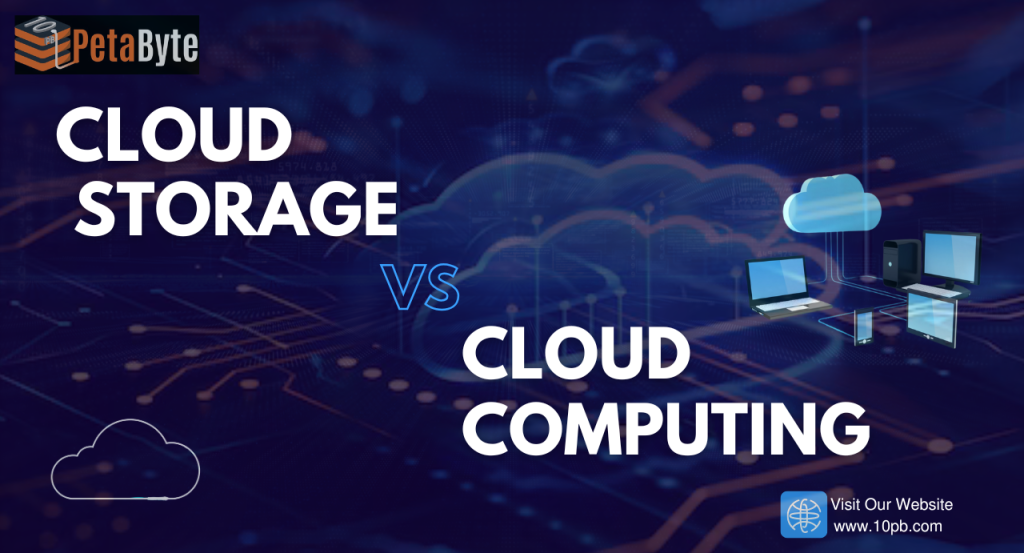Introduction
With companies and individuals using cloud technology more and more, the terms cloud computing and cloud storage are often used interchangeably. However, they serve different purposes and offer unique advantages. Understanding the difference between cloud storage and cloud computing is crucial for making informed decisions about your digital infrastructure.
In this article on cloud storage vs cloud computing, we’ll break down both services, highlight key differences, and guide you on when to use each. Whether you’re running a business, developing an app, or just need efficient file access, knowing the right type of cloud service can make all the difference.
What is Cloud Storage?
Cloud storage allows users to store data, files, and digital content on remote servers accessed through the internet. Unlike saving files on a local device, cloud storage services host your data in secure, off-site data centers managed by cloud providers.
Major Cloud Storage Benefits:
-
File syncing and automatic backups
-
Remote access from any device
-
Scalable storage capacity
-
Data redundancy for protection
-
User-based sharing and permissions
Top Cloud Storage Providers:
-
10PB Cloud by NFC Data Centre (ideal for enterprise-level data)
-
Dropbox
-
Microsoft OneDrive
-
Amazon S3
-
Google Drive
Common Use Cases:
-
Personal file and photo backups
-
Team document sharing
-
Secure storage for customer data
-
Compliance storage for healthcare or legal industries
What is Cloud Computing?
Cloud computing refers to delivering a wide range of computing services—like servers, storage, databases, networking, and analytics—over the internet. Instead of managing hardware in-house, users can access scalable computing resources via the cloud.
Key Features of Cloud Computing:
-
On-demand computing power
-
Virtual machines and containers
-
Data analytics and AI tools
-
SaaS, IaaS, and PaaS delivery models
-
High scalability and cost efficiency
Popular Cloud Computing Examples:
-
Amazon Web Services (AWS)
-
Microsoft Azure
-
Google Cloud Platform (GCP)
-
IBM Cloud
-
Oracle Cloud
Use Cases Include:
-
Hosting applications and websites
-
Running AI or machine learning models
-
Performing large-scale data analytics
-
Creating and managing virtual desktops
-
Delivering cloud-native SaaS platforms
Key Differences: Cloud Storage vs Cloud Computing
Let’s compare cloud storage vs cloud computing in terms of functionality and use cases:
| Feature | Cloud Storage |
|
|
|---|---|---|---|
| Primary Function | Data storage and access | Performing computing tasks and running applications | |
| Use Case | File backups, sharing, and syncing | App development, analytics, server hosting | |
| Resources Provided | Disk space | Computing power, memory, processing | |
| User Base | Individuals, small businesses, enterprises | Developers, IT teams, data scientists | |
| Examples | Google Drive, Dropbox, 10PB Cloud | AWS EC2, Google Compute Engine, Azure VM |
Which One Should You Choose?
Choose Cloud Storage if:
-
You need to store or share files like documents, photos, or videos
-
Automatic backups and data protection are a priority
-
Your team collaborates on shared files
-
You want a scalable storage solution without owning infrastructure
Example: 10PB Cloud offers scalable, enterprise-grade cloud storage—perfect for businesses in healthcare, media, or finance.
Choose Cloud Computing if:
-
You’re building or hosting a website or mobile app
-
You need flexible computing resources for development or testing
-
You analyze big data or run virtual environments
-
You prefer customized infrastructure solutions without managing hardware
Cloud computing powers digital giants like Netflix, Uber, and Airbnb, allowing them to scale fast and deliver seamless customer experiences.
Can Cloud Storage and Cloud Computing Work Together?
Absolutely. Many businesses leverage cloud storage and cloud computing together for powerful digital workflows:
-
A cloud-based app like Google Docs uses cloud computing to process user inputs and cloud storage to save the documents.
-
Companies analyzing large data sets rely on cloud storage to hold raw data and cloud computing to run analytics and visualizations.
Combining the two results in a seamless, scalable digital ecosystem.
Advantages of Cloud Technology for Businesses
Whether you choose cloud storage, cloud computing, or both, cloud technology offers numerous benefits:
-
Scalability: Easily scale storage or computing power as you grow
-
Cost-efficiency: Pay only for what you use, with minimal overhead
-
Security: Leading cloud services offer encryption and compliance features
-
Remote Access: Teams can collaborate from anywhere
-
Automation: Automate backups, updates, and system failovers
Conclusion
In summary, cloud storage vs cloud computing isn’t about which is better—it’s about choosing the right tool for your specific needs. While cloud storage is ideal for managing and accessing files, cloud computing enables advanced processing, hosting, and digital scalability.
By understanding the difference between cloud storage and cloud computing, businesses and individuals can make better decisions and leverage the best of cloud services for their goals. In many cases, integrating both leads to optimal performance, flexibility, and digital success.


